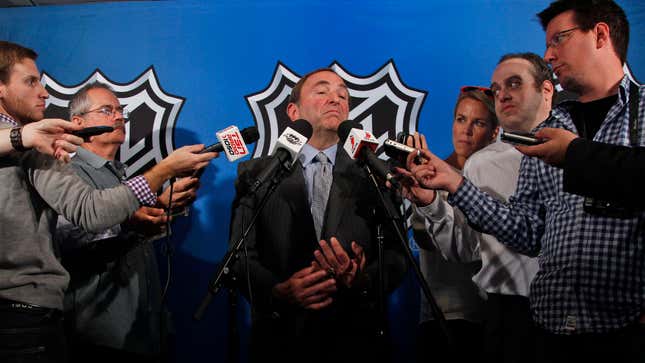
There are great sporting rivals in the world—India and Pakistan in cricket; Real Madrid and Barcelona in football; the Yankees and the Red Sox in baseball. And then there is the bitterest clash of all: labor versus capital.
This classic match-up has been on full display in United States sport, with labor strife pitting the owners of professional sports teams against a players’ union (in the case of the National Hockey League) and, more bizarrely, against a union of American football referees (in the case of the National Football League). Professional athletes have responded in ways that are instructive about how workers function in a global marketplace.
In hockey, the NHL management wants to pay players a smaller cut of revenues, due to rising costs and the recession. The players have refused, and the NHL has locked them out, so the season is on hold and the players can’t work. Yet the National Basketball Association and the NFL have offered their players similar terms in the last 18 months, and got them to agree, in the NBA’s case after a lockout cancelled two months of the season.
Why the differences? American football isn’t played much outside America, so when there’s a lockout, players don’t have much chance of a job abroad instead. Basketball is global, but the NBA is by far the world’s biggest basketball league, so defecting to another country’s league limits a player’s opportunities—though small overseas leagues did offer some to NBA players during last season’s labor dispute. The NHL, though, has good-sized competitor leagues around the world. And now some NHL players, many of whom are foreign-born, are headed for spots in the Russian and Swiss professional hockey leagues. Czech-born NHL player Jaromir Jagr returned home to find half-a-dozen familiar faces from the NHL also working in the Czech league.
True, staying in America has its benefits. The hockey players can expect large crowds if they stay there, which bring higher revenues. But like skilled workers anywhere in the world, if they don’t like the wages, they’ll find employment elsewhere. While the NHL has proven it can weather labor strife, having rebounded from a locked-out season seven years ago, it’s clear the players have some leverage, too.
NHL players finding new leagues to play in is the perfect analogy for a lot of industries that rely on highly-skilled labor: While the largest markets provide the best opportunities for skilled workers, their abilities are in demand worldwide. A Czech software developer, for instance, might be more productive in Silicon Valley, but if immigration policy or high rent keeps him out, he can still succeed back home. Developed nations that forget this fact risk losing their competitive advantage over time. They could actually learn something from sports leagues which typically do a good job tapping the globe for talent.
The consequences of locking out skilled labor were made plain in the NFL, where replacement referees supervised play during the early part of the season. Botched calls, ignored rules and bad game management provided both a poor product and clear evidence that talent matters to big businesses. If a union controls the talent, it has some leverage—which helped lead the NFL to strike a deal in time for this weekend’s games.
The question is whether politically-embattled unions in the United States, where private sector unionization is sinking, can maintain that kind of control. The NFL deal was not a signal of triumph for American unions, or arguably even for the referees’ union. It failed to get defined-benefit pensions for future referees, which had been a key sticking point in the negotiations; and most American workers bid adieu to pensions like those long ago. Without unions from across different sectors acting in solidarity, it’s very difficult for any one union to protect its compensation.
The two cases show what happens on a worldwide playing field where labor is becoming more globally fungible. Workers gain some advantages from the global marketplace, especially when they become skilled enough to leverage their value in different playing fields. But most of the time, employers gain an even bigger advantage by being able to draft talent from anywhere. When it comes to recession-inspired cost cutting, this rivalry isn’t even close.